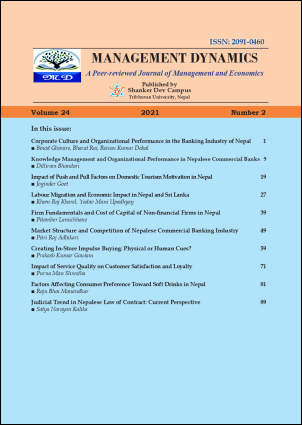Corporate Culture and Organizational Performance in the Banking Industry of Nepal
DOI:
https://doi.org/10.3126/md.v24i2.50031Keywords:
adaptability, banking, consistency, culture, participatory, performanceAbstract
Determining the strength of corporate culture and its impact on commercial bank performance has long been a priority for Nepalese banks. This study identified corporate culture drivers and their effects on a Nepalese commercial bank's performance. This study aimed to examine the impact of Nepalese commercial banks' participation, consistency, and adaptability cultures on organizational performance from the perspective of the employees of Nepalese commercial banks. A descriptive research design was used to discover facts and information on cultural elements affecting shareholder value. This study was based on a questionnaire survey. This study utilized the 5- point Likert scale to study a statistical measurement of corporate culture and organizational performance in Nepalese Commercial Banks. Using a survey of 394 employees in the Nepalese commercial banks, this study took into account participatory, consistency, and adaptability to assess the corporate culture of the banks. Adaptability was found to be the strongest predictor of organizational performance, while consistency was found to be a poor predictor, with the highest and lowest beta values, respectively. These findings suggested that adaptability and consistency characteristics were useful in measuring organizational performance. Adaptability cultures, it is concluded, have a significant impact on how well a business performs its activities. It broadens the awareness of the cultural impact on organizational performance that banks, particularly in Nepal, typically overlook. Commercial banks should prioritize strengthening their competitive cultures by emphasizing more adaptive human values aligned with their goals.
Downloads
Downloads
Published
How to Cite
Issue
Section
License
Copyright © Research Management Cell, Shanker Dev Campus




